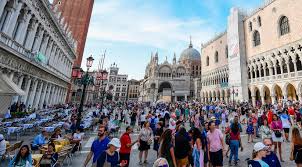In a bid to preserve the tranquility and authenticity of Venice, the iconic Italian city has introduced a series of regulations aimed at curbing the negative impacts of mass tourism. The latest measures, set to go into effect on August 1, include limiting the size of tourist groups and prohibiting the use of loudspeakers by tour guides within the city and its surrounding islands of Murano, Burano, and Torcello.
The primary objective behind these new rules is to safeguard the well-being of local residents and create a more pedestrian-friendly environment for both visitors and inhabitants alike. Violations of the regulations could incur fines ranging from €25 to €500, emphasizing the city’s commitment to maintaining order and tranquility.
This initiative follows Venice’s earlier implementation of a day-tripper entrance fee, a pioneering move that sought to address the challenges posed by excessive tourism during peak seasons. Although initial reactions have been mixed, with some locals expressing concerns about the city’s transformation into a “theme park,” the measures reflect a proactive approach to managing the influx of visitors and preserving Venice’s cultural heritage.
The issue of over-tourism in Venice has attracted global attention, with the city being listed as an endangered destination by UNESCO. Environmental degradation caused by motorboats and cruise ships, as well as the commercialization of historic buildings, are among the key threats identified by the organization.
With approximately 20 million tourists visiting Venice in 2023—significantly surpassing the local population of under 50,000—the city faces a delicate balancing act between economic dependence on tourism and the preservation of its unique identity. Like other European cities grappling with similar challenges, Venice is exploring innovative solutions to strike a harmonious balance between catering to visitors and safeguarding the quality of life for its residents.
As Venice charts a course towards sustainable tourism management, the world watches with keen interest to see how these new regulations will shape the city’s future and whether they will succeed in mitigating the adverse effects of over-tourism while maintaining its allure as one of Europe’s most beloved destinations.
Related stories:
Catch up on the top stories and travel deals by subscribing to our newsletter!












Leave a Reply